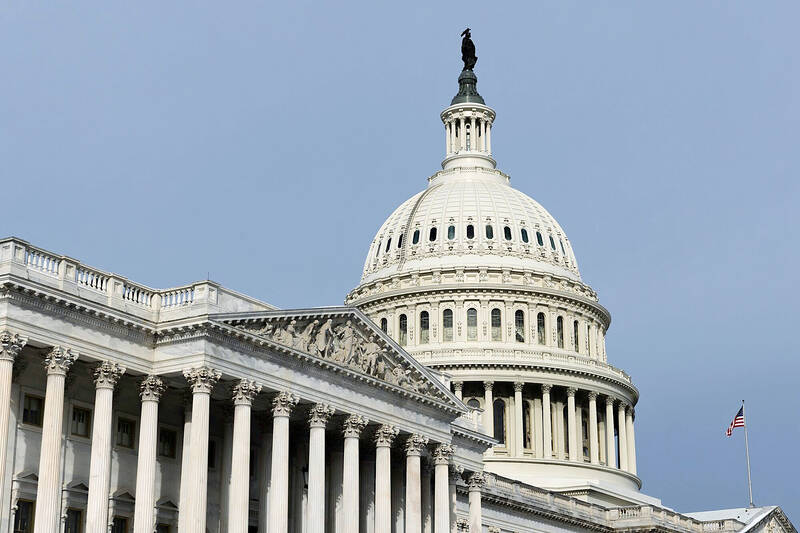A US bill that would provide tax incentives for Taiwanese businesses and workers in the US on Friday overwhelmingly passed the committee stage in the US Congress.
The US House of Representatives Committee on Ways and Means voted 40-3 to send the Tax Relief for American Families and Workers Act of 2024 to the US House for a full floor vote on the bill.
The bill’s proposals include a plan to “strengthen America’s competitive position with China by removing the current double taxation that exists for businesses and workers with a footprint in both the United States and Taiwan,” the committee said in a statement after the vote.

Photo: Bloomberg
Providing double taxation relief for such businesses and individuals would support innovation and competitiveness, as well as promote economic growth, the committee said.
Committee Chairman US Representative Jason Smith said in the statement that the act is expected to help US job creators stay competitive, allow main street businesses to survive and grow, and provide tax relief to working families struggling under the weight of rising prices and interest rates.
“The Tax Relief for American Families and Workers Act will help America compete and win against countries like China, encourage small businesses to grow and invest in American jobs and opportunity, and save taxpayer dollars by ending a COVID-era policy that has become the poster child for fraud,” Smith said.
“This tax relief package builds on the success of the 2017 Tax Cuts and Jobs Act, which produced a proven track record of delivering for families, reducing poverty and unemployment, and attracting more economic investment in communities across America” he added.
In Taipei, the Ministry of Finance has long sought a double taxation relief agreement with Washington to protect their mutual interests, as Taiwan-US economic exchanges and business activities accelerate.
In a meeting in Taipei with two former US officials on Monday, President Tsai Ing-wen (蔡英文) expressed hope that the two sides would soon address double taxation.
Taiwan-US relations continue to serve as a driving force for regional and global prosperity and development, Tsai told former US national security adviser Stephen Hadley and former US deputy secretary of state James Steinberg, who met with the president two days after the Democratic Progressive Party won the presidential election.
In Washington on Friday, White House press secretary Karine Jean-Pierre said that progress on the Tax Relief for American Families and Workers Act was encouraging and welcome.
The bill was expected to pass the US House and Senate, before being signed into law by US President Joe Biden, Pierre said.

SECURITY: As China is ‘reshaping’ Hong Kong’s population, Taiwan must raise the eligibility threshold for applications from Hong Kongers, Chiu Chui-cheng said When Hong Kong and Macau citizens apply for residency in Taiwan, it would be under a new category that includes a “national security observation period,” Mainland Affairs Council (MAC) Minister Chiu Chui-cheng (邱垂正) said yesterday. President William Lai (賴清德) on March 13 announced 17 strategies to counter China’s aggression toward Taiwan, including incorporating national security considerations into the review process for residency applications from Hong Kong and Macau citizens. The situation in Hong Kong is constantly changing, Chiu said to media yesterday on the sidelines of the Taipei Technology Run hosted by the Taipei Neihu Technology Park Development Association. With

A US Marine Corps regiment equipped with Naval Strike Missiles (NSM) is set to participate in the upcoming Balikatan 25 exercise in the Luzon Strait, marking the system’s first-ever deployment in the Philippines. US and Philippine officials have separately confirmed that the Navy Marine Expeditionary Ship Interdiction System (NMESIS) — the mobile launch platform for the Naval Strike Missile — would take part in the joint exercise. The missiles are being deployed to “a strategic first island chain chokepoint” in the waters between Taiwan proper and the Philippines, US-based Naval News reported. “The Luzon Strait and Bashi Channel represent a critical access

‘FORM OF PROTEST’: The German Institute Taipei said it was ‘shocked’ to see Nazi symbolism used in connection with political aims as it condemned the incident Sung Chien-liang (宋建樑), who led efforts to recall Democratic Progressive Party (DPP) Legislator Lee Kun-cheng (李坤城), was released on bail of NT$80,000 yesterday amid an outcry over a Nazi armband he wore to questioning the night before. Sung arrived at the New Taipei City District Prosecutors’ Office for questioning in a recall petition forgery case on Tuesday night wearing a red armband bearing a swastika, carrying a copy of Adolf Hitler’s Mein Kampf and giving a Nazi salute. Sung left the building at 1:15am without the armband and apparently covering the book with a coat. This is a serious international scandal and Chinese

COUNTERINTELLIGENCE TRAINING: The ministry said 87.5 percent of the apprehended Chinese agents were reported by service members they tried to lure into becoming spies Taiwanese organized crime, illegal money lenders, temples and civic groups are complicit in Beijing’s infiltration of the armed forces, the Ministry of National Defense (MND) said in a report yesterday. Retired service members who had been turned to Beijing’s cause mainly relied on those channels to infiltrate the Taiwanese military, according to the report to be submitted to lawmakers ahead of tomorrow’s hearing on Chinese espionage in the military. Chinese intelligence typically used blackmail, Internet-based communications, bribery or debts to loan sharks to leverage active service personnel to do its bidding, it said. China’s main goals are to collect intelligence, and develop a